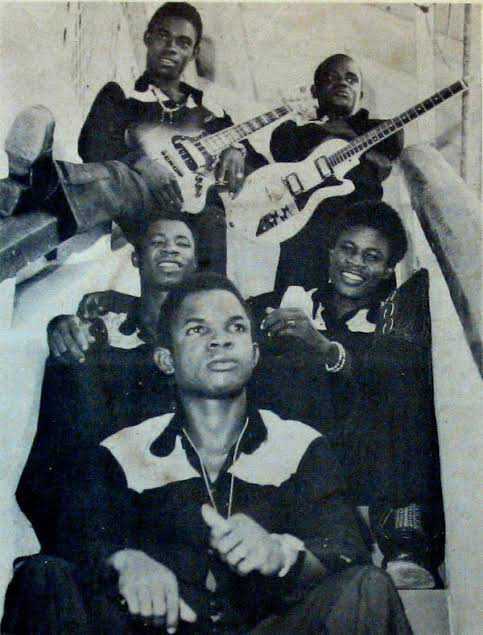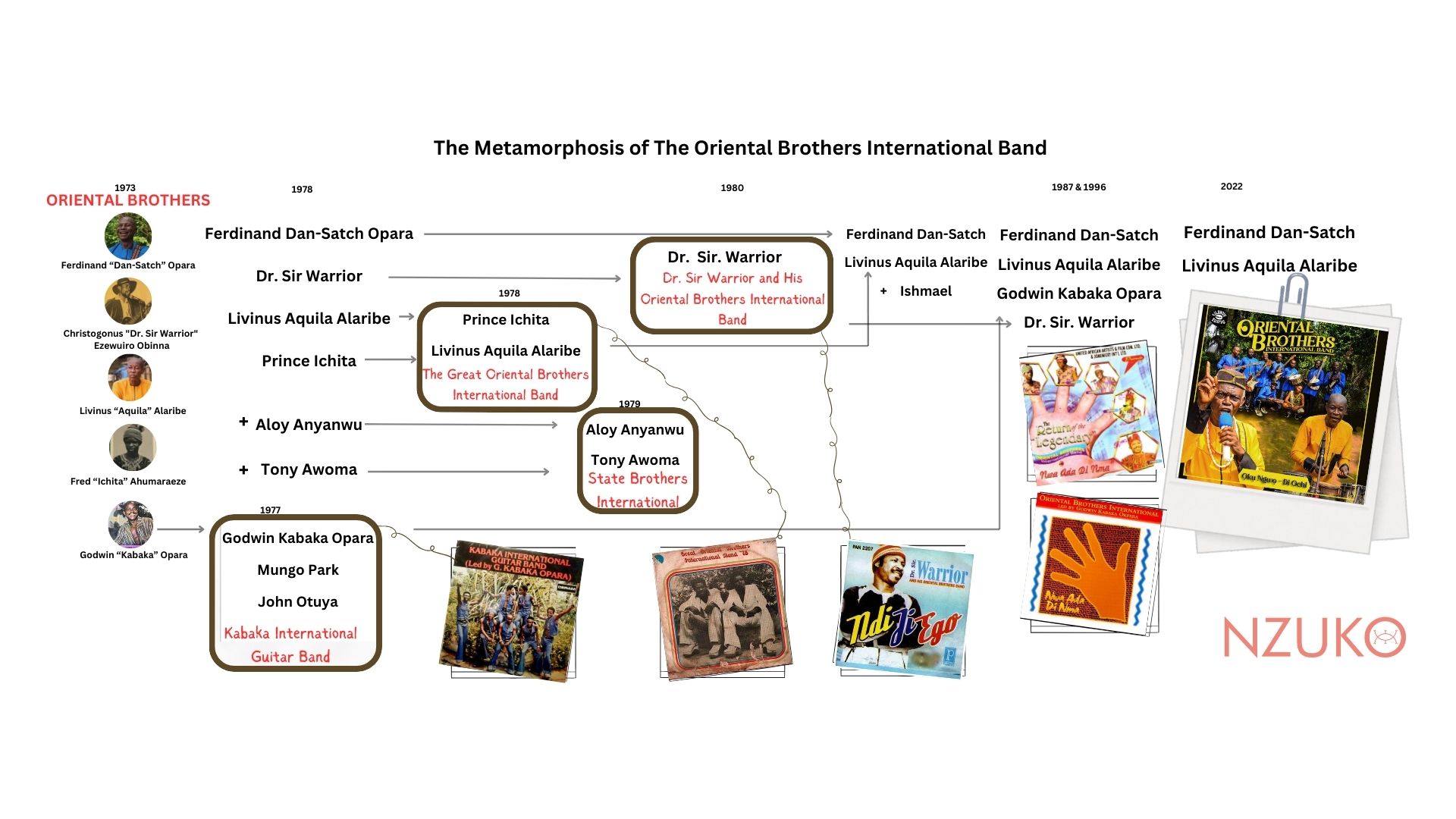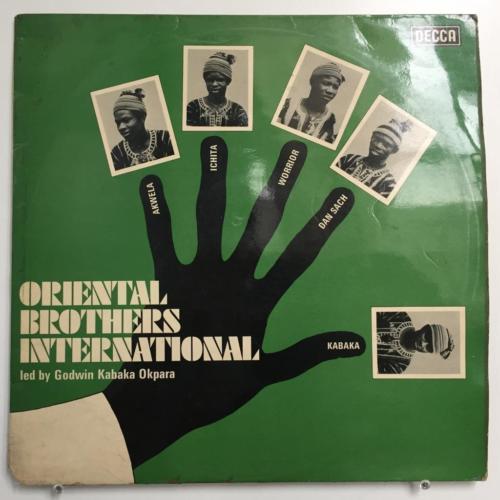Five Kings from the East: The Story of the Founding Members of The Oriental Brothers International Band
Tochukwu Precious Eze
- 21st August 2024

It was perhaps the most pivotal moment in the country's history. The Biafra War of 1967 to 1970 had just ended. The nation was grappling with the aftermath, as people endeavored to adapt to their new realities. This period was particularly crucial for the Igbo people of southeastern Nigeria, who had endured significant losses and now faced the daunting task of rebuilding their lives from scratch. It is a story of unwavering determination and resilience, as ndị Igbo diligently worked to reclaim their glory. However, the immediate post-war era was fraught with challenges, necessitating the emergence of new voices and melodies to uplift spirits and inspire hope.
Five exceptionally talented men stepped up to this challenge, forming The Oriental Brothers International Band, and embarking on a journey to create timeless music that would resonate for decades to come.
Ferdinand Chukwuemeka “Dan-Satch” Opara (Founder, lead and bass guitarist)
Godwin “Kabaka” Opara (Band leader, rhythm guitarist)
Christogonus "Dr. Sir Warrior" Ezewuiro Obinna (Lead vocalist)
Livinus "Aquila" Alaribe (Conga player)
Fred “Ichita” Ahumaraeze (Drummer)
The Genesis
There has long been a debate over the origins of The Oriental Brothers. Some sources attribute its founding to Kabaka, while others assert that Dan-Satch was the driving force behind the esteemed band. This discrepancy likely stems from the band's registration listing Godwin Kabaka Opara as its leader, leading many to assume he founded the group. Kabaka, however, did little to dispel this assumption, and in fact, seemed to encourage it. In an
interview, Godwin Kabaka Opara claimed to have established the band, which initially performed in-house at the Easy-Going Hotel in Owerri, before inviting Sir Warrior, Dan-Satch, Aquila, and Ichita to join him.
Ferdinand Dan-Satch Opara, however, has provided a more coherent narrative of The Oriental Brothers International Band's formation in various
interviews. He recounts the scouting and recruitment of each member, a version of events corroborated by his associate and fellow founding member, Livinus Aquila Alaribe. Dan-Satch explained in
a discussion with The Niche that he had opted to designate Kabaka as the band leader, a decision Kabaka was uncomfortable with, leading to tensions and eventually Kabaka's departure.
Aquila was the first to join Ferdinand Dan-Satch in 1972, although at that time, they were not yet known as The Oriental Brothers. Kabaka followed suit, followed by Warrior and Ichita.
The road to becoming trailblazers in the realm of highlife music in the country was far from smooth for the band. Dan-Satch recalls their initial relocation from Enugu to Kano in pursuit of sponsorship and recording opportunities. However, their time in Kano proved to be challenging, as they struggled to secure deals and sustain both themselves and the band financially. Upon receiving advice to try their luck in Lagos, where opportunities were said to be more abundant, they found that the obstacles persisted.
Just when it appeared that the band had reached a dead end, Dan-Satch turned to his brother-in-law, who owned the Easy-Going Hotel in Ikeja. They struck an agreement allowing the band to perform at the hotel, providing them with a temporary reprieve to continue their quest for recording contracts and opportunities to audition. Despite facing rejections from some recording companies, they eventually caught the attention of Decca West Africa Recording Company, courtesy of Victor Nwogwugwu, who was working as a receptionist at Afrodisia (Decca) at the time. Shortly after the auditions, they received an invitation to the studio to record "Ihe Chinyere m." It was during the recording of their first album that the band settled on the name Oriental Brothers, inspired by the biblical wise men from the east.
The Oriental Brothers International Band's inaugural album, "Uwa Atualamujo/Ihe Chinyere m," was recorded in 1973. Following its release, their fame skyrocketed with the unveiling of their 1974 album, "Oriental Brothers International," notably featuring the track "Ihe Oma," which garnered widespread acclaim for its peculiar melody.
The band's initial four years of recording were marked by a golden era of success and unforgettable moments. Their signature sound, characterized by layered rhythms created with five guitars (four lead guitars and a bass), captivated not only the Igbo community in Nigeria but also audiences worldwide. Despite thriving during a period when awards were not as prevalent as they are today, The Oriental Brothers still managed to earn several gold and silver records. Decades later, they are indisputably revered as legends in the industry, and their music continues to be celebrated across continents.
Alongside the band's success and the growing individual popularity of its members, arose a desire for personal recognition. Some members envisioned iterations of The Oriental Brothers where their names and faces would take center stage. Dan-Satch confessed that he had to part ways with these members as they no longer wished to remain part of the group.
Kabaka was the first to depart from the band in 1977. In an interview with Soundwela, he cited unresolved conflicts with other band members as the reason for his departure, subsequently forming the Kabaka International Guitar Band, releasing fourteen albums, and recruiting new talents. The Oriental Brothers then enlisted Aloy Anyanwu and Tony Awoma to fill the void, but they too departed in 1979 to establish the State Brothers International. Prince Ichita, alongside bandmate Livinus Aquila, founded The Great Oriental Brothers International Band, while Christogonus (Warrior) branched out in 1980 to create Dr. Sir Warrior and His Oriental Brothers International Band.
After Ichita's demise in the early 1980s, Aquila reunited with Dan-Satch, and they enlisted Ishmael as the new vocalist. Attempts to reunite the original band and recapture their signature sound led Kabaka and Dr. Sir Warrior to collaborate with Dan-Satch and Aquila in 1987, and later in 1996. Sadly, Sir Warrior passed away in 1999, followed by Kabaka twenty-five years later, leaving only two of the founding Oriental Brothers.

Anyị Abịala Ọzọ (2022)
Nearly 50 years after their debut album, The Oriental Brothers International Band released a five-track album titled “Oku Ngwo - Di Ochi” in 2022, led by the two surviving members of the original band: Dan-Satch Opara and Aquila Alaribe. This achievement was made possible by Palenque Records, a label specializing in Afro-Colombian and African music. According to
Vladimir Cagnolari of Pan African Music, listening to the album feels like stepping back in time. It serves as a poignant reflection of our past, our identity, and our enduring resilience in the face of adversity.


